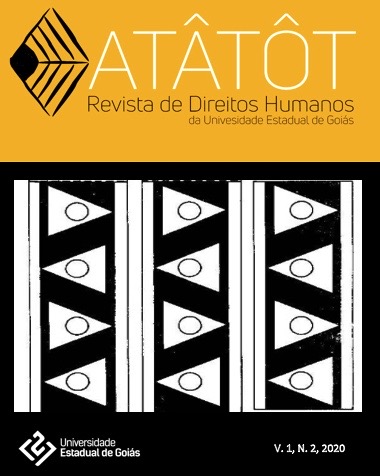Vol. 1 No. 2 (2020): jul./dez.(2)

Atâtôt, the Interdisciplinary Journal of Human Rights of UEG, is a biannual academic publication under the responsibility of the State University of Goiás. Its goal is to create interdisciplinary spaces for the publication of articles, essays, reviews, and other academic texts on the general theme of human rights, focusing on topics related to democracy, constitutional issues, and social struggles for rights.
In its second issue, Atâtôt: Interdisciplinary Journal of Human Rights from UEG presents discussions on human rights from a critical perspective, bringing various views on the importance of social and political struggles for the realization of human rights in Brazil, Kurdistan, England, Syria, and Turkey.
The first article, “Conflicting Views of the Political Community in the Middle East: the Kurdish Model as an Alternative to Theocracy and Nationalism”, by Prof. Dr. Hanifi Baris (University of Aberdeen, Scotland), reflects on democratic confederalism and the political community model developed by the dominant Kurdish political movements in North and West Kurdistan (Turkey and Syria) in the face of existing political institutions in Turkey and in Syria in particular and the Middle East in general.
The second article, “Jurisdiction to Sue a Parent Company in the English Courts for the Actions of its Foreign Subsidiary: Vedanta v Lungowe and Post-Brexit Implications”, by Prof. Dr. Mukarrum Ahmed (Lancaster University, England), examines private international law and substantive liability issues in proceedings against a UK-based parent company in the face of human rights violations by actions of foreign subsidiaries, addressing, to that end, the historic Vedanta v Lungowe ruling by the UK Supreme Court.
The third article, “The Legacy of Transitional Justice in Brazil: Experiences and Challenges”, by Prof. Me. Luis Emmanuel Barbosa da Cunha (UFPE, Brazil) and Prof. Me. Manoel Moraes (UNICAP/PE, Brazil), taking as a starting point the Security Council Resolution S/2004/616 on the Rule of Law and Transitional Justice in post-conflict societies and the international doctrinal construction of the Center for Transitional Justice (ICTJ), addresses how transitional justice becomes concrete and accessible in the city of Recife/PE.
The fourth article, “Constitutionalism as a Void Signifier at the Outskirts of World Society: What can the category “State terrorism” say about global constitutionalism?”, by the PhD student in Political Science Maria Eduarda Borba Dantas (UnB, Brazil), analyzes the concept of “State terrorism” to counterpoint the hegemonic debate about transnational forms of constitutionalization and, thus, develop the category “peripheral constitutionalism”.
The fifth article, “From the Slave Stories to Quilombos in Brazil and the Recognition of the Remnants by the Brazilian Supreme Court”, by Prof. Me. Áurea Bezerra de Meedeiros (IESB, Brazil) and Prof. Dr. Menelick de Carvalho Neto (UnB, Brazil), starting from a critical analysis of slavery in Brazil, portrays the struggles of the black people in search of their rights as a person, as an individual, in a context of structural racism.
The sixth article, “Necropolitical Education: Authoritarian Personality, Violence and Schooling of Poor Young People in Brazil”, by Prof. Dr. Eguimar Felício Chaveiro (IESA-UFG, Brazil) and Prof. Dr. Rosivaldo Pereira de Almeida (UEG, Brazil), addresses the educational dimension and the necrophilic character of the wreckage and capture of the subjectivities present in the schooling processes, dialoguing, for that, with Mbembe (2012), Adorno (1951), Rolnik ( 2018) and Bourdieu (1998).
The seventh article, “The Invisibility of Women in Street Situation and the Relativity of their Rights”, by Prof. Me. Thiago Henrique Costa Silva (UNIALFA, Brazil), Prof. Me. Luciana Ramos Jordão (UEG, Brazil) and lawyer Patrícia Leão Ferreira (UNIALFA, Brazil), examines the living conditions of women living on the streets and the relativization of their rights from a perspective of the law found on the street.
The eighth article, “Freedom of Speech, Media and Tolerance”, by the PhD student in Human Rights Rakell Dhamarys Moreira (PPGIDH/UFG, Brazil), by Prof. Dr. Angelita Pereira de Lima (PPGIDH/UFG, Brazil), and the MD student in Human Rights Ana Paula de Castro Neves (PPGIDH/UFG, Brazil) discusses how freedom of expression, constitutionally guaranteed from a liberal perspective, is intolerant whenever it excludes the other's speech, thereby reinforcing the hegemonic discourse.
Finally, there are two monographic works.
The first, “What is Truth?”, by the MD and Tax Auditor of Goiás State Revenue Cláudio Gonçalves Pacheco, reflects on the concepts of truth and their implications for Law, for the materialization of human rights, as well as for human rights related to social justice and tax justice, dialoguing, for this purpose, with Ronald Dworkin and Michel Foucault
The second, “Towards a Practical Centrality of Human Rights: Primacy for the Dignities of Humans in the Prison System”, by Prof. Me. Philipe Anatole G. Tolentino (Faculty Sensu, PPGIDH/UFG, Brazil), addresses the tension between the theoretical plan and the plan for the implementation of fundamental human rights, with the Prison System as a background, and the human rights theory as the central basis.









